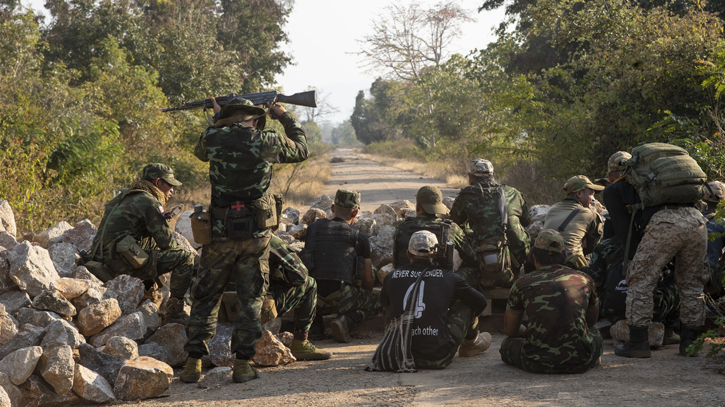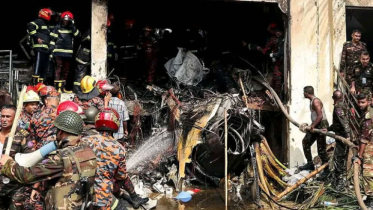
Photo: Collected
China has reportedly brokered a peace talk and signed an agreement between the Myanmar military junta and an alliance of armed resistance that have made military gains in eastern Myanmar since the last quarter of the previous year.
The Three Brotherhood Alliance of resistance groups stated that following a round of China-brokered talks in Kunming, the two sides had agreed to pull their troops back from the frontlines and to ensure that “China’s interests in Myanmar are not harmed,” said a Chinese and Kachin-language statement issued on Monday.
The alliance, which includes the Myanmar National Democratic Alliance Army (MNDAA), the Ta’ang National Liberation Army (TNLA), and the Arakan Army, launched a broad offensive against junta positions in the region in late October, according to Sebastian Strangio, Southeast Asia editor at The Diplomat.
The two sides have promised to pull back forces from frontline positions and safeguard Chinese interests in northern Shan State.
However, the Brotherhood Alliance has denied any comprehensive breakthrough in fresh talks between the Alliance and junta, reports The Irrawaddy, a pro-Alliance media.
No new major agreements between Myanmar’s armed ethnic Brotherhood Alliance and the junta were made during the latest round of peace talks brokered by China.
The Irrawaddy newspaper quoting officials said the representatives of the tripartite alliance met with a military regime delegation in Kunming City for three days of talks that ended on Sunday.
The meeting followed up on peace talks mediated by Beijing in January that resulted in a ceasefire between junta troops and the alliance in northern Shan State, which borders China.
Before the January talks, the alliance had seized regime-controlled border trade hubs along with a large swath of northern Shan State after launching its Operation 1027 offensive at the end of October last year.
During January’s talks, both sides agreed to discuss troop deployments and border trade between China and Shan State at future meetings.
People familiar with the latest round of talks said that negotiations on the resumption of border trade with China dominated the meeting.
The agreement involved the reopening of the overland trade between Myanmar and China, after a prolonged interruption due to the fighting that followed Operation 1027.
According to the agreement, the MNDAA and the military have agreed to a 70-30 split of the proceeds from customs at the Chinshwehaw border gate, which fell in the early weeks of Operation 1027.
The two sides have not yet agreed on how to divide up the revenue from the Muse-Ruili border crossing, which handles the lion’s share of the China-Myanmar border trade.
The potentially most important agreement is the Myanmar military’s agreement formally to recognize the MNDAA as the government of the Kokang special region.
The MNDAA took control of the Kokang capital Laukkai in January, after ousting the military-aligned Border Guard Force that had run the region for the past 15 years in collusion with a handful of Chinese crime families.
However, the military regime insisted that alliance troops withdraw from the border trade zone and that border trade should be managed by governments, not by armed groups. No agreement was made.
Meanwhile, Arakan Army Vice Commander Brigadier General Nyo Tun Aung confirmed the alliance had held a new round of talks with the junta during on Monday.
He said topics discussed included sustaining the ceasefire, eradicating the border cyberscam industry, and operations in border trade zones, but declined to provide details.
AA’s Vice Commander said the China-mediated ceasefire only covers AA forces active in northern Shan State.
“It’s only for our troops in northern Shan State and has nothing to do with the AA in Rakhine,” Vice Commander said
Radio Free Asia reports that Brigadier General Aung said, “We continue to discuss the previous Haigeng Agreement at every meeting.”
AA has expressed concern over the China-Myanmar border issue, how to eradicate the online scamming business and how the border exits should be reopened.
Political analyst and former regime army officer Hla Kyaw Zaw told RFA that the current ceasefire talks are solely due to pressure from China and are not a satisfactory situation for both sides.
On the other hand, the Arakan Army vows to fight for total control of Myanmar’s Rakhine state. The group said a ceasefire with the military in Shan state has no bearing on its activities in Rakhine State.
At a ceremony in the capital Naypyidaw on 13 February, the junta chief Senior Gen. Min Aung Hlaing said he will only pursue peace in Myanmar according to the 2008 military-drafted constitution and would never acquiesce to demands made by the armed resistance.
Messenger/Disha








